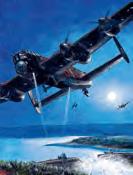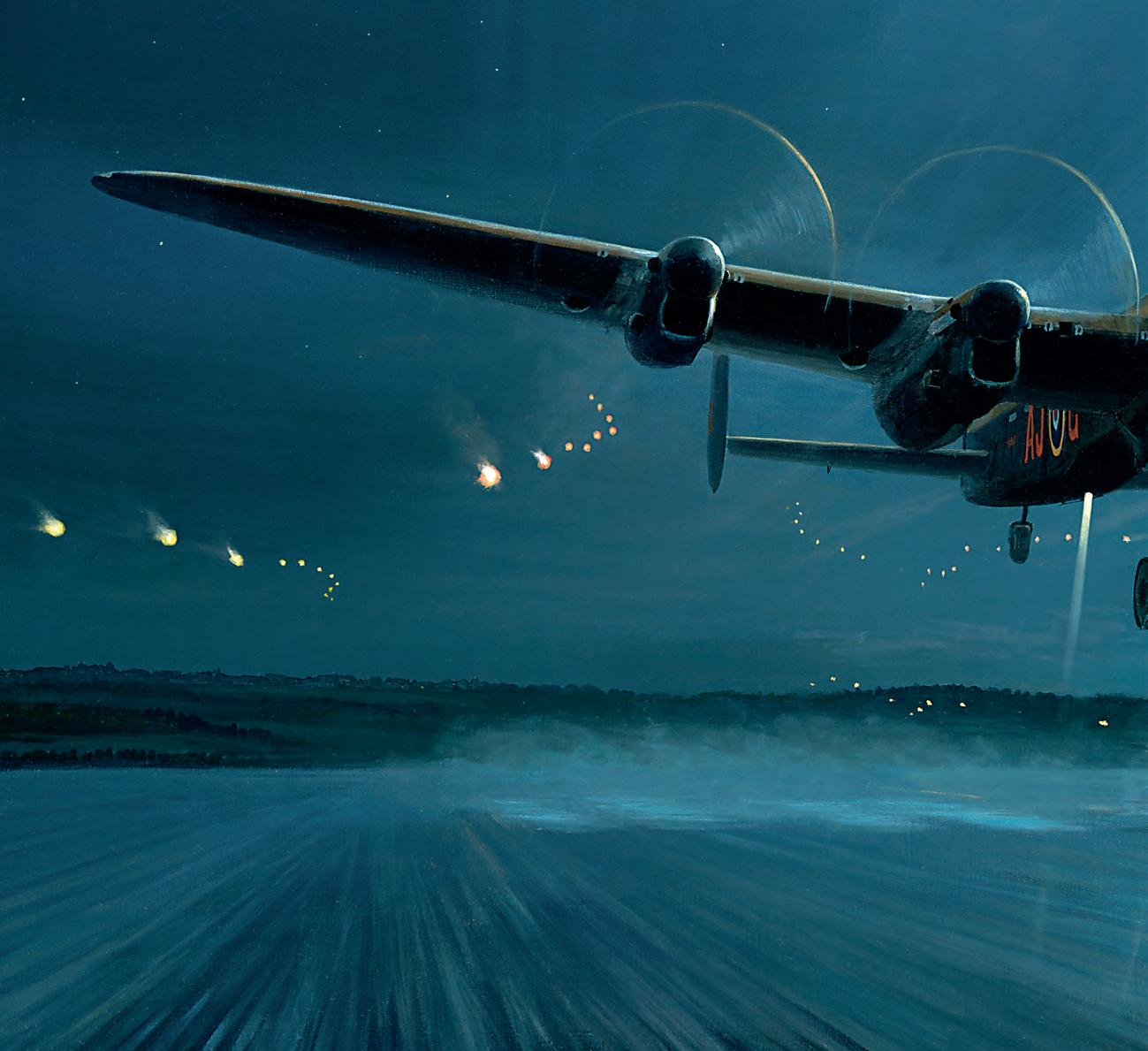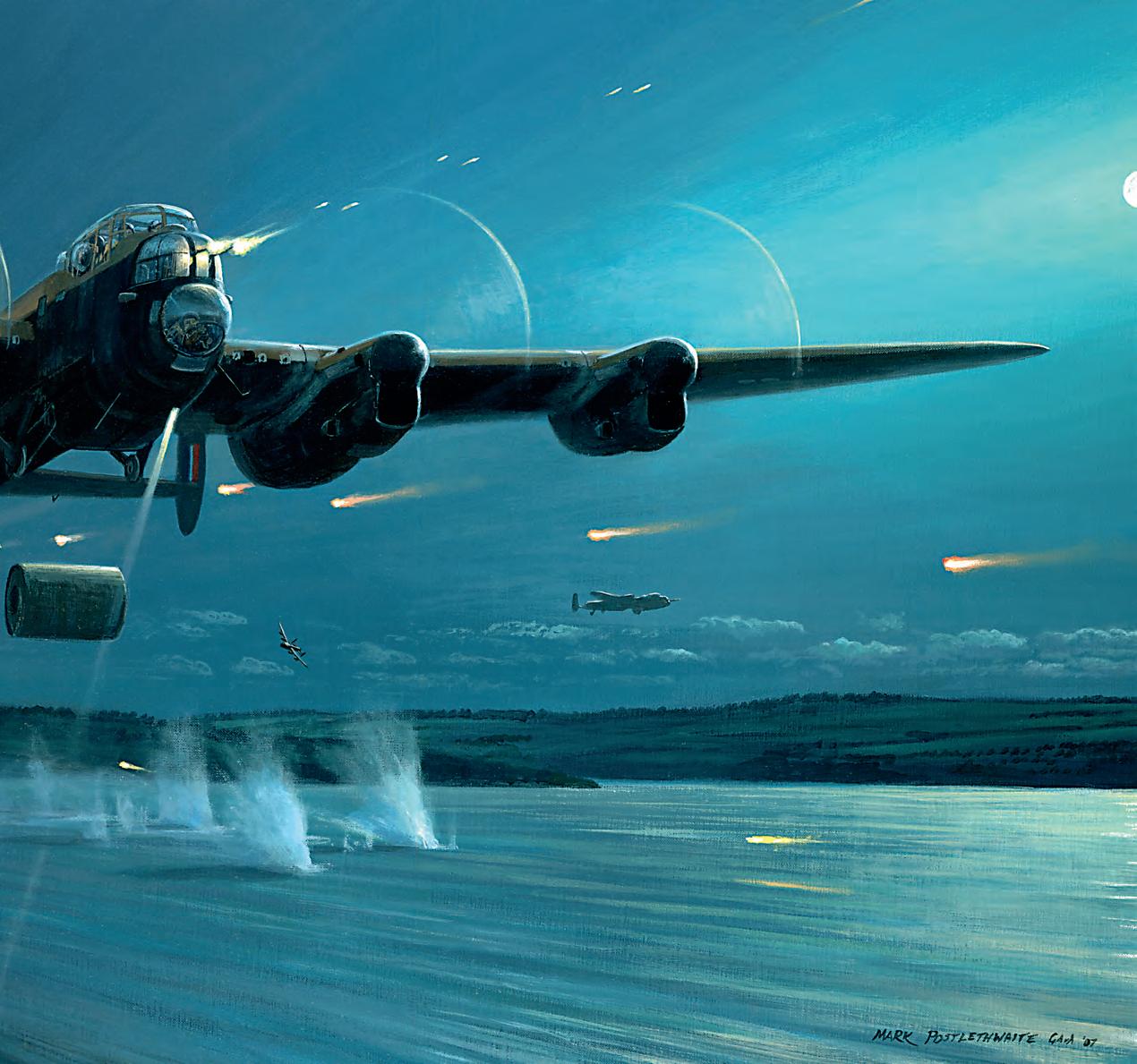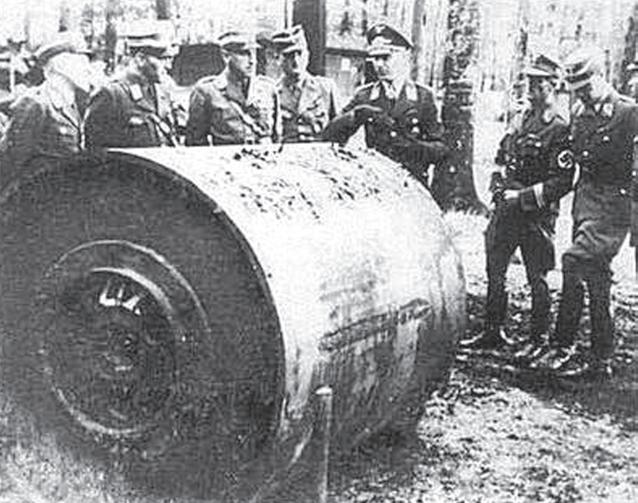














 The sun is still setting as three 617 Squadron Lancasters coast out from England heading for enemy territory on May 16, 1943, for Operation Chastise – the Dams Raid. (© Gary Eason / Flight Artworks)
The sun is still setting as three 617 Squadron Lancasters coast out from England heading for enemy territory on May 16, 1943, for Operation Chastise – the Dams Raid. (© Gary Eason / Flight Artworks)
DAMBUSTERS
DAMBUSTERS




Special thanks to the following for their help and generosity in providing material or images for this publication:
Special thanks to the following for their help and generosity in providing material or images for this publication:
RAF Battle of Britain Memorial Flight
RAF Battle of Britain Memorial Flight
John Bell OBE DFC
John Bell OBE DFC
Tim Callaway
Sarah James –RAF Scampton Heritage Centre
Sarah James –RAF Scampton Heritage Centre
Len Krenzler
Len Krenzler
The Lincolnshire Aviation Heritage Centre
The Lincolnshire Aviation Heritage Centre
Yvonne Masters
Mark Postlethwaite
Yvonne Masters
Stuart Reid
Mark Postlethwaite
Jim Shortland
Stuart Reid
Fred Sutherland
Jim Shortland
Robert Taylor
Fred Sutherland
Phil Tetlow
Robert Taylor
Phil Tetlow
Editor: Clive Rowley MBE RAF (Retd)
Design: Craig Lamb
Editor: Clive Rowley MBE RAF (Retd)
Sarah Scrimshaw
Charlotte Turnbull
Design:
Sarah Scrimshaw, Charlotte Turnbull
Reprographics: Paul Fincham, Jonathan Schofield
Angie Sisestean
Reprographics: Jonathan Schofield
Picture research/admin: Sarah Wilkinson
Picture research/admin:
Publisher: Steve O’Hara
Sarah Wilkinson
Group production editor:
Publishing director: Dan Savage
Tim Hartley
Marketing manager: Charlotte Park
Production manager:
Craig Lamb
Commercial director: Nigel Hole
Publisher:
Dan Savage
Published by:
Commercial director: Nigel Hole
Mortons Media Group Ltd, Media Centre, Morton Way, Horncastle, Lincolnshire LN9 6JR. Tel: 01507 529529

Managing director: Brian Hill
Printed by: William Gibbons and Sons, Wolverhampton
Published by: Mortons Media Group Ltd, Media Centre, Morton Way, Horncastle, Lincolnshire LN9 6JR Tel: 01507 529529
ISBN: 978-1-911276-57-9
This edition © 2018 Mortons Media Group Ltd. First published 2013.
All material copyright Mortons Media Limited, 2013. All rights reserved.
Printed by: William Gibbons and Sons, Wolverhampton
ISBN 978-1-909128-21-7
All rights reserved. No part of this publication may be reproduced or transmitted in any form or by any means, electronic or mechanical, including photocopying, recording, or any information storage retrieval system without prior permission in writing from the publisher.
As the author of this special, commemorative publication, I feel that I should start by declaring my credentials which, on the face of it, have little do with being an expert on the Dambusters or the Avro Lancaster bomber. You see I am – or at least I was – a fighter pilot; I served for 36 years in that capacity with the Royal Air Force.

A background as a fighter pilot does not, though, rule out an interest in RAF Bomber Command’s campaign during the Second World War. Indeed the precedent is set as the first author to write of the exploits of 617 Squadron, Paul Brickhill, was himself an ex-fighter pilot who flew Spitfires and Hurricanes during the war. His bestselling book – The Dam Busters – was first published in 1951.
I am proud to say that I, also, have flown many hours on Spitfires and Hurricanes with the RAF Battle of Britain Memorial Flight (RAF BBMF), finishing my full-time career as the officer commanding the RAF BBMF. As such, I was the temporary
custodian of one of the finest collections of airworthy Second World War aircraft anywhere, including one of only two airworthy Lancasters in the world. On many occasions, some of them quite important, I have flown alongside the BBMF’s mighty Lancaster in a Spitfire or a Hurricane, marvelled at the aura of the big bomber in the air – strangely shaped yet purposeful and somehow rather beautiful – and I have wondered what it was like for the men that flew them in far more dangerous circumstances. It has been my great privilege to meet many of those who did just that.
I share with every fighter pilot I have ever met, including those who fought in the Second World War, a deep respect for the men of Bomber Command and what they endured and achieved. Fighter pilots need to be brave, determined and aggressive, but the courage required by those who flew the heavy bombers during the war, is of a different order. They needed a steady, calm, unblinking, understated kind of courage and tenacity, sustained over long periods and
night after night. Many were fearful men and rightly so, but they overcame their fear with sheer courage and appeared fearless, instilling confidence in those around them and particularly in the other members of their crew. Amazingly to us today, they did not think that what they were doing was anything particularly special. They were just doing the job they were given to do in wartime, to the best of their abilities... and they paid a heavy price.
I first read Paul Brickhill’s book The Dam Busters when I was a boy and in many ways the story of the Dams Raid is like a Boy’s Own story: Barnes Wallis and his madcap bouncing bomb, designed to be skipped to a target thus far considered invincible, by hand-picked airmen formed into a special squadron, who were, in some cases, little older than schoolboys.
In fact though, this single raid had an impact totally out of proportion to the small number of aircraft involved. It embodied the synergy of science and technology, weapons development and production, mission planning and practice, and the unflinching courage of the aircrews in the execution of a highly dangerous feat of arms.
Furthermore, it established a legend that still resonates today. The Dams Raid and the Battle of Britain are the RAF’s most famous wartime exploits as far as most people are concerned. The story of the Dams Raid is a truly incredible one; a fabulous tale of ingenuity, daring and raw courage.
Seventy-five years on from Operation Chastise, as it was officially named, the Dams Raid still commands widespread attention. Crowds flock to commemorative events; documentaries continue to be made about it, and the 1955 box office-hit film The Dam Busters, starring Richard Todd as Guy Gibson and Michael Redgrave as Barnes Wallis, appears frequently on the television, deservedly so as it is a marvellous film. For most people in the 21st century, their understanding of what happened during the night of May 16/17, 1943, and the lengthy lead-up to the operation, is heavily influenced by that film; it is more about entertainment than education, and in 105 minutes much detail has to be left out and some facts are blurred or changed by artistic licence.
When I was asked if I would like to write this publication on the Dambusters and given a free rein over the content, it didn’t take me long to decide that it was something I should do. It seems entirely










